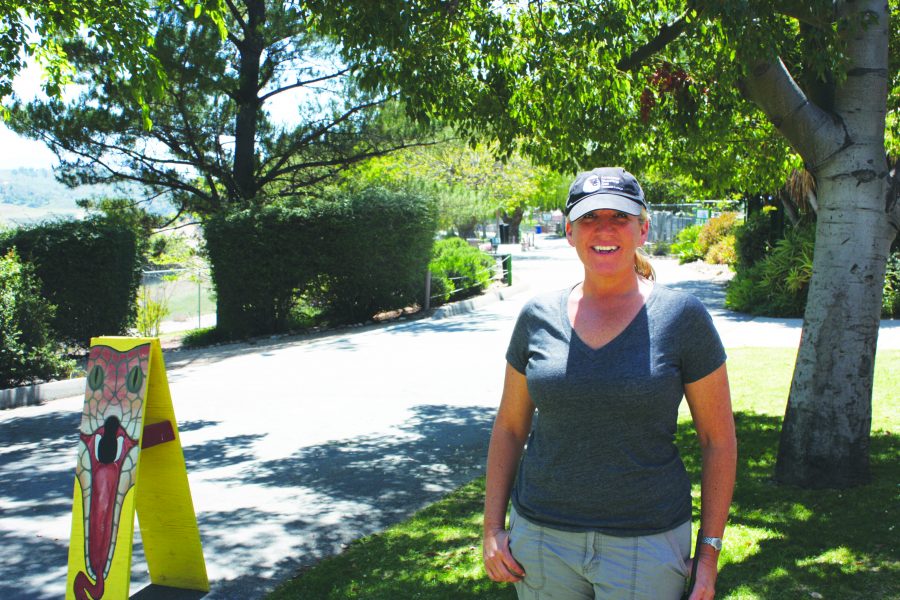EATM goes international
Mara Rodriguez poses outside of the EATM offices before her trip to Japan.
April 29, 2014
For the last 16 years, Mara Rodriguez, a Zoo Operations Lab Technician at Exotic Animal Training and Management (EATM), has been organizing visits from Japanese students to Moorpark College to witness our zoo and EATM program. Now in a role reversal, Rodriguez will be visiting the Kake Educational Institute in Japan to promote the EATM program.
On May 14, Rodriguez will begin her ten day stay in Okayama, Japan. Once there, she will lecture at three universities, tour the Okayama University Science Fish Farm, meet with the staff of the Kake Educational Institute, and attend the 10th anniversary of the Chiba Institute of Science.
“We are pleased to support her participation,” said Moorpark College Interim President Dr. Bernard Luskin. “The invitation we received is an important international compliment to Moorpark College and its EATM program.”
Mara Rodriguez will lecture at Kurashiki University of Science and the Arts, Okayama University of Science, and Hirosima University, which are a few of the schools that make up the Kake Educational Institution. She will talk about the history of the EATM program, give a general overview of Moorpark College and describe in detail the classes that EATM students take. The lectures will also focus on the uniqueness of the EATM program that attracts the attention of students from around the country, and even around the world.
“Here in the United States, we [Americans] are definitely the pioneers in zoo keeping and wildlife conservation and education,” said Rodriguez.
In Japan, the only animal training programs that are available are dog grooming and pet business programs, such as dog training and pet store management. Japanese students refer to these kinds of programs and jobs as “The Pet Business”.
“The whole concept of wild animals, training and the zoo setting is totally exotic to them, and that’s why they’re all so excited to come here,” said Rodriguez.
The zoos in Japan are run by employees who were grandfathered into the career, so to speak. According to Rodriguez, those employed by a zoo have the job because their father worked at the zoo, as well as his father before him.
The universities that Rodriguez will be lecturing at are also the universities that send students to Moorpark. Every November and December, groups of Japanese students gather at the zoo in one to two day visits.
“The visits started with watching shows, touring the facilities and a talk about our program,” said EATM Department Chair Brenda Woodhouse. “It has grown into an all day visit, culminating with a certificate documenting their visit to EATM.”
When the students come to Moorpark, they not only come to see the zoo and undertake various workshops, but they also come to see the spectacle, the real animals on display: the American youth.
The Japanese students are just as fascinated with the EATM students as they are with the animals. The students from abroad even take pictures of the EATM students, singling them out as the average young college student, according to Rodriguez.
The overseas students want to experience the American culture, and not just its exotic animal training and management techniques. According to Rodriguez, when the students aren’t at the zoo, they’re spending the rest of their trip at Disneyland and Universal Studios, soaking up the lifestyle and following the typical tourist’s list of “things to do in America”.
It is important to keep in mind that the trips made by both Rodriguez to Japan and the Japanese students to MC, are strictly business and both parties take it seriously. If one is conducting business in Japan, then he or she must know how to operate in a Japanese business setting.
When handed a business card in America, traditionally one glances at it and then shoves it into his or her pocket. That is ideal if you plan on insulting the Japanese and destroying all business ties with them. When handed a business card in Japan, one should receive it with two hands and carefully study it before placing it in one’s pocket.
Rodriguez learned proper Japanese business etiquette through years of coordinating and leading the visits made by Japanese students to the zoo.
She is exercising this knowledge to make her trip as smooth as possible. Before she departs, Rodriguez will load a backpack full of gifts with impeccable wrapping for everyone that she meets. As is the Japanese tradition, she anticipates being showered with gifts by everyone upon meeting them.
Rodriguez is both excited and nervous for her trip. Since all expenses are paid for, she is at the mercy of the Kake Educational Institute once off the plane. She hopes there will be someone at the airport to pick her up and basically show her around and tell her where to go.
“I’m excited because I get to go to a county whose people and culture I have always admired,” said Rodriguez.








